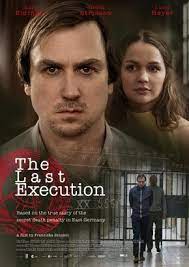
THE LAST EXECUTION
Germany, 2021, 116 minutes, Colour.
Lars Eidinger, Devid Strriesow, Louise Heyer.
Directed by Franziska Stunkel.
East Germany, the early 1980s. The film is based on a true story but with names changed. The director sought the advice of the widow of the central character and showed the film to her for a private screening with the widow not wanting to make any public comment.
Franz Walter is an academic, in a happy relationship, about to travel to Africa for fieldwork before an academic promotion. There are some momentary alarm as he goes on to the plane, authorities arrive, taking him off without any explanation. But, he is recruited to work for the Stasi.
Franz sees this as a great opportunity, he and his partner receive a fine apartment, he goes to the various meetings, is mentored by another Stasi operative, Dirk. The main operation shown in the film is the targeting of an East German footballer who has moved to West Berlin and the authorities want him back, his wife still in the east, their letting the footballer know that she has terminal illness. Walter and Dirk also travel to the west, eye-opening for Walter, revealing the more hedonistic side of Dirk and visits to clubs and meeting women. They contact football professionals to blackmail them to spy. But, Walter sees a beggar in the streets and wonders.
Ultimately, Walter is disillusioned with the methods and the targets, decides on an expose, supported by his partner. However, situations change and he is arrested, charged, brought to the courts for treason. While his defence lawyer puts up some kind of argument for him, he is sentenced to death – not executed in a formal way but shot in the head as he moves through a corridor.
The film then indicates the number of executions that took place in the decades of the East German Republic. The film can be linked with other exposes of life in those decades, especially the award-winning The Lives of Others. Top German actor, Lars Eidinger, is convincing in the central role.
- Based on a true story? Dr Walter Teske, his career, trial, execution?
- German cinema and its interest in East Germany during the communist era? The way of life, repression, the Stasi, espionage, loyalty to the state, trials and executions?
- The title, the audience knowing the outcome from the beginning? Indications of the trial in fast forward early in the film? The dramatic buildup in Franz Walter’s career, action, caution, disillusionment, the personal effect, decisions?
- The focus on Franz? Age, experience, studies? Hopes, the trip to Africa, qualifications? Going to the plane, ordered off, audience suspicions? The news of his promotion? The professor and her recommendation? The interviews, the job, the ministry, secrecy, signed documents? His relationship with Corina, the proposal? Taking her to the apartment, hopes for a comfortable life? The wedding ceremony, the party members present, his and her parents, sense of tension? The gift of the windsurfboard?
- Franz, Dirk, supervisor, loyalty to the state? Franz being employed because of his football connections? The football player, playing in West Germany, considered disloyal to the state, trying to entice him back, his wife remaining, the plan to say that she has terminal illness? The contact with the various players and managers, the player and getting him into a compromising situation with Klara, his spying, giving information, her pregnancy and decisions to be made, Franz persuading her for an abortion, the resistance?
- The football players and managers in West Berlin, wary of the Stasi, blackmailed?
- The effect on Franz, the visit to the west, initial refusal by Dirk, company, the meetings with the footballers? The nightlife, the women, Dirk’s behaviour, perfume for his wife, the death of his child? Franz, seeing the double-edged behaviour, the beginning of his change of heart?
- The meetings, the stern leadership, the plans, deceits, loyalty above all? The visit to the footballer’s house, Franz writing the message on the toilet paper, the later visit, the body in the bath, Franz sick, destroying the evidence?
- The tensions with Corina at home, her not understanding, his not being able to communicate? Silence, drinking? Corina going with Dirk for the windsurfing? The Ministry later suggesting the affair?
- Franz and his plan, collecting the photos, bringing them home, surveillance, showing them to Corina, the death of the footballer, the decision to take the photos back, the officials occupying his office, coming back home?
- The intimations of the trial during the film? The arrest, search and humiliation, the cell, torture with the lights on and off? His lawyer, the defence plans? The stories about Corina and Dirk? The trial itself, the prosecution, the accusations, punishment, the death sentence? The effect on Franz, his speech and plea, the defence by the lawyer? The later visit to the cell, the lawyer unable to do anything?
- The meeting between Franz and Corina, the reunion, the ring with the biro?
- Franz, accompanied throughout the prison, his suddenly being shot? At least not a prolonged execution?
- A true story, the statistics about those condemned to execution during the Communist regime?